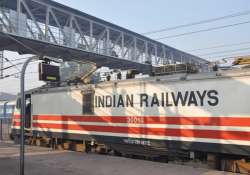Setback for SAIL as Railways eyes private suppliers for rail tracks supply
The Railways is undergoing a USD 130 billion (approx Rs 8.5 lakh crore) overhaul to modernise the world’s fourth-largest network, which is disrupted by ageing tracks and saturate capacity.

In a move which could end the monopoly of Steel Authority of India (SAIL) on supplying steel for standard rail tracks, the Indian Railways is opening up annual purchases worth up to USD 700 million (approx Rs 4,600 cr) to the private sector, say a Reuters report.
The Railways is undergoing a USD 130 billion (approx Rs 8.5 lakh crore) overhaul to modernise the world’s fourth-largest network, which is disrupted by ageing tracks and saturate capacity.
With railways plagues with repeated derailments, the government has already launched a special safety fund of Rs 1 lakh crore that will cover upgradation of tracks and signalling besides elimination of unmanned level crossings.
Last week, the Ministry of Railways told Parliament that the train accidents due to track defects have risen by 25 per cent in the last two years.
The company’s data reveals that SAIL, in the current fiscal year, is set to fall short of around 2,50,000 tonnes of rails of its 8,50,000 tonne target – its eighth shortfall in 10 years, and its biggest.
The report cited SAIL executives saying that a sudden jump in demand for steel – up by 45 per cent since 2015 – to replace old tracks and lay new ones meant it was struggling to meet demands.
The company, however, said that its new rolling mill launched at its main plant at Bhilai, would boost its capacity by around 1,00,000 tonnes.
Losing even a small part of its sales to the railways would be a blow to SAIL, which has lost money in seven straight quarters.
"SAIL's performance has been very poor and given that we have a MoU (Memorandum of Understanding), any failure will not be appreciated," a government official said, quoting from a January 11 letter from the railways to the Steel Ministry that oversees SAIL, threatening to sever a deal to buy rails almost exclusively from the company.
The rails shortfall has slowed Prime Minister Narendra Modi’s plans to revamp the network and highlights how his infrastructure investment drive is forcing government units to get tough on suppliers.
The forerunner among private suppliers is Jindal Steel and Power Ltd, which has already exported rails to Iran and has tried for years to muscle in on SAIL’s business.